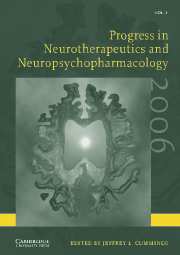Book contents
- Frontmatter
- Contents
- Preface
- Contributors
- Introduction to neurotherapeutics and neuropsychopharmacology
- Rivastigmine in the treatment of dementia associated with Parkinson's disease: a randomized, double-blind, placebo-controlled study
- Modafinil for the treatment of fatigue in multiple sclerosis
- Radiotherapy with concurrent and adjuvant temozolomide: a new standard of care for glioblastoma multiforme
- Treating migraine attacks ASAP: concept and methodological issues
- Early phase trials of minocycline in amyotrophic lateral sclerosis
- Creatine as a potential treatment for amyotrophic lateral sclerosis
- AVP-923 as a novel treatment for pseudobulbar affect in ALS
- Liquid fluoxetine versus placebo for repetitive behaviors in childhood autism
- Testing multiple novel mechanisms for treating schizophrenia in a single trial
- Selegiline in the treatment of negative symptoms of schizophrenia
- Analysis of the cognitive enhancing effects of modafinil in schizophrenia
- Efficacy and tolerability of ziprasidone and olanzapine in acutely ill inpatients with schizophrenia or schizoaffective disorder: results of a double-blind, six-week study, with a six-month, double-blind, continuation phase
- Subject index
- Author index
Early phase trials of minocycline in amyotrophic lateral sclerosis
Published online by Cambridge University Press: 22 March 2010
- Frontmatter
- Contents
- Preface
- Contributors
- Introduction to neurotherapeutics and neuropsychopharmacology
- Rivastigmine in the treatment of dementia associated with Parkinson's disease: a randomized, double-blind, placebo-controlled study
- Modafinil for the treatment of fatigue in multiple sclerosis
- Radiotherapy with concurrent and adjuvant temozolomide: a new standard of care for glioblastoma multiforme
- Treating migraine attacks ASAP: concept and methodological issues
- Early phase trials of minocycline in amyotrophic lateral sclerosis
- Creatine as a potential treatment for amyotrophic lateral sclerosis
- AVP-923 as a novel treatment for pseudobulbar affect in ALS
- Liquid fluoxetine versus placebo for repetitive behaviors in childhood autism
- Testing multiple novel mechanisms for treating schizophrenia in a single trial
- Selegiline in the treatment of negative symptoms of schizophrenia
- Analysis of the cognitive enhancing effects of modafinil in schizophrenia
- Efficacy and tolerability of ziprasidone and olanzapine in acutely ill inpatients with schizophrenia or schizoaffective disorder: results of a double-blind, six-week study, with a six-month, double-blind, continuation phase
- Subject index
- Author index
Summary
Key words: amyotrophic lateral sclerosis; minocycline; clinical trial; neurodegeneration.
Introduction and Overview
Amyotrophic lateral sclerosis (ALS), a neurodegenerative disease characterized by selective motor neuron cell death, leads to progressive weakness and death in an average of 3 years (Rowland & Shneider, 2001). There is no cure or known treatment that improves function. The mechanisms of motor neuron degeneration are not fully understood, but there is evidence that mitochondrial dysfunction, free radical toxicity, glutamate excitotoxicity, and intermediate filament-aggregation lead to activation of genes and enzymes that control cell death pathways, including apoptosis (Martin, 1999; Wiedemann et al., 1998; Rothstein et al., 1992; Hirano, 1991). Up-regulation of stress enzymes such as p38 mitogen activated protein (MAP) kinase and release of mitochondrial cytochrome c may contribute to activation of pro-inflammatory and pro-apoptotic modulators (Zhu et al., 2002; Mota et al., 2001; Horstmann et al., 1998; Migheli et al., 1997; Schiffer et al., 1996). Inflammatory cells and cytokines, including inducible nitric oxide synthase (iNOS), components of the complement cascade, and pro-apoptotic caspase enzymes are activated in areas of neurodegeneration in ALS (Almer et al., 2001; Li et al., 2000; Martin et al., 2000; Kostic et al., 1997). Caspase enzyme inhibitors and anti-inflammatory agents slow progression in the transgenic mouse model of ALS (Drachman et al., 2002; Barneoud and Curet, 2000; Friedlander et al., 1997).
Minocycline, which has both anti-inflammatory and anti-apoptotic properties, crosses the blood–brain barrier, and has been shown to have neuroprotective effects in models of ALS and other neurodegenerative disorders.
- Type
- Chapter
- Information
- Publisher: Cambridge University PressPrint publication year: 2006



